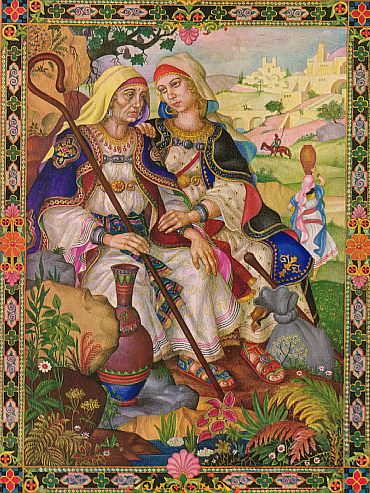Not long ago on Facebook, someone, as I recall, a fellow Unitarian Universalist minister mentioned visiting a new city and seeing announcements for worship services for the two most liberal congregations. The UU church advertised the sermon title as “On Consciousness,” while the progressive Christian congregation had a sermon advertised as “Bad Girls of the Bible.” The minister asked, “Which one would you attend?”
Now, I actually would have been interested in that reflection on consciousness. But, I take the colleague’s meaning. There is something of a tasty morsel on the hook with a title like bad girls.
And, so, I decided I’d give a talk on that subject at my home congregation.
Delivered it today.
Probably not the best time for a sermon with the title bad girls in the title. I wanted to do something on Jezebel, but was told that’s probably not a great subject for Mother’s Day.
So, I decided to stretch “bad” a bit, and went with Naomi & Ruth.
For reasons that at some time in the mists of the past made sense, I decided it would be from notes rather than a prepared text as is usually, okay, always my wont at the church. After the service, I consulted my spouse who said, I offered a lot of “hums” and I kept mixing up Ruth and Naomi’s names, although she was able to follow well enough.
Otherwise, I gather, it was okay.
Ruth isn’t a bad girl, but she comes from a bad neighborhood, and is forced into rough situations.
And the story is about strong women who survive.
It appears to have been written about five hundred years before the common era, but the story itself takes place maybe a thousand years before the common era. Think historical novel.
Many find it just too much to work with. The patriarchal culture is worse than oppressive. Women are quite literally property.
But.
The story has Naomi and her husband leave famine torn Judea and settle in Moab, a land of historical (at least in these stories) enemies. She has two sons. They both marry. For a while they all prosper. Then both her husband and her sons in law all die. This leaves the women in an untenable position. She decides to return to Judea and tells her daughters in law to return to their families.
Ruth refuses.
In one of the most moving of lines in the Hebrew scriptures, Ruth says, “Intreat me not to leave thee, or to return from following after thee: for whither thou goest, I will go; and where thou lodgest, I will lodge: thy people shall be my people, and thy God my God: Where thou diest, will I die, and there will I be buried…”
The two women return to Judea, where they’re reduced to gleaning to survive. A kinsmen of Naomi’s casts a fond eye on Ruth, admiring her industry, and perhaps her figure. Guided by Naomi Ruth snags a husband and with one small danger moment, all ends well.
A happy story. If you don’t read too closely into the horrors women were subjected to, sexual bondage, and pretty much excepting what sexuality could mean, their near helplessness in the face of the culture…
And it is the story of survivors.
It is important in Judaism, as well, as one of the early descriptions of that universalist tendency that would catch and flourish in the Jewish faith. Ruth is a foreigner, worse, a Moabite. And she becomes an ancestor of David (and therefore for the Christian religion when it comes around, of Jesus).
But, what caught me, and caused me to sit with it, even if Ruth was barely a bad girl, was that line.
“Intreat me not to leave thee, or to return from following after thee: for whither thou goest, I will go; and where thou lodgest, I will lodge: thy people shall be my people, and thy God my God: Where thou diest, will I die, and there will I be buried…”
I realized it had koanic qualities about it.
That is the line contains within it a description of something about reality.
And, it invites a response.
So, I asked people in the congregation, if they agreed the line described something true?
One of the kids said, “love.”
Then another kid held up his hand and said, “love.”
Later a parent who was too shy to stick up her hand at the time said to me, “commitment.”
I kind of liked these responses. For me there is a pointing to the way we’re all caught up together, we are intimately related, and something follows out of noticing. Call it commitment. Call it love.
And, of course, it calls for some kind of response.
I asked.
One of the kids, kids get koans better than adults, I’ve noticed, said, “well, if you love someone you do things.” I gather in their family going out to a mother’s day dinner was in the works.
I liked that.
And, said, “Now, if it is a koan we shouldn’t just talk about it, we should do something specific.” And, I walked up and grabbed a congregant by the hand, and we walked up the aisle together.
Small trick.
But, people seemed to get it.
Oh, and people made me promise to talk about Jezebel sometime, or, one of the other really bad girls in the Bible.
I’m sure I will…













